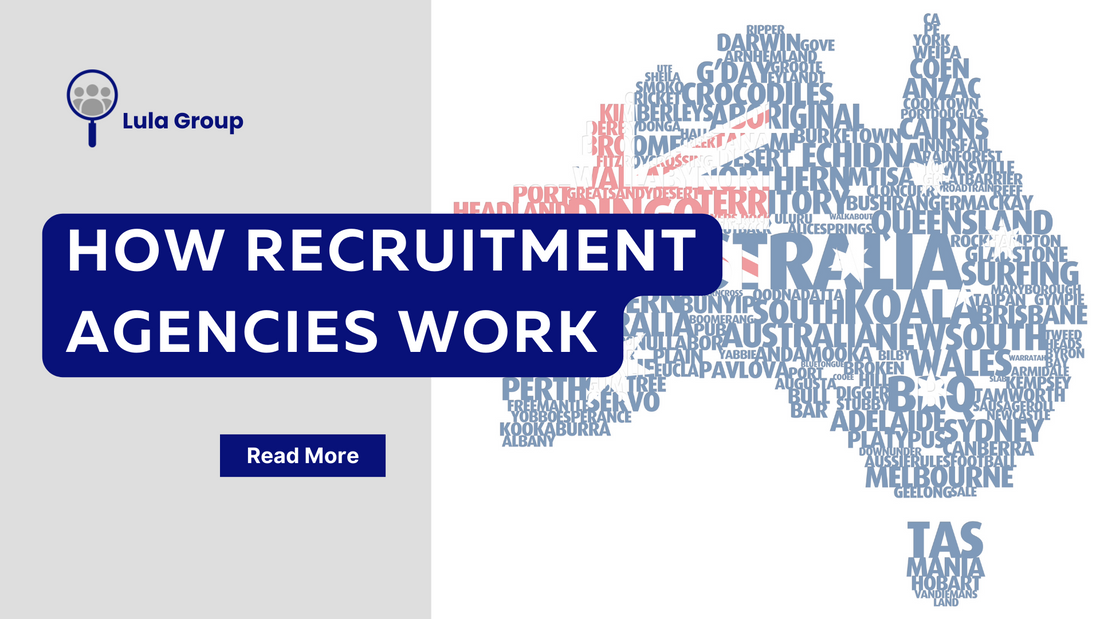In today's Sydney recruitment and the dynamic Australian job market, finding the right job or hiring the perfect candidate can be daunting. This is where recruitment agencies in Australia play a pivotal role.
Recruitment agencies are intermediaries between job seekers and employers, connecting skilled individuals with suitable job opportunities. Their expertise lies in matching the right talent with the right job, streamlining the hiring process, and facilitating successful placements.
As a recruitment agency in Australia, In this article, we will delve into the working of recruitment agencies in Australia, exploring their role, functions, and the benefits they offer to employment in Australia, job seekers, and employers.
The role of recruitment agencies in Australia
Recruitment agencies in Australia serve as a bridge between job seekers and employers. They have extensive networks and access to job opportunities and talent across various industries.
These agencies are equipped with the expertise to match the right candidate with the right job, taking into consideration the candidate's skills, qualifications, and experience, as well as the employer's requirements.
Moreover, recruitment agencies in Australia often have a deep understanding of the local job market, candidate requirements, and industry trends. They can provide valuable insights and guidance to job seekers and employers, helping them navigate through the complexities of the hiring process.
From ATS-compliant resume writing and interview preparation to creating a compressive hiring checklist, recruitment agencies offer various services to support job seekers and employers.
Types of recruitment agencies in Australia
Recruitment agencies in Australia can be categorised into different types based on their specialisation and target audience. Some agencies focus on specific industries such as IT, healthcare, or finance, while others offer a broader range of job opportunities across multiple sectors.
Additionally, there are recruitment agencies that cater to temporary or contract-based employment, as well as those that specialise in executive or senior-level positions.
Choosing a recruitment agency depends on your specific needs and career goals. For example, If you are looking for employees in the e-commerce industry, approach agencies that specialise in e-commerce recruitment. Employment agencies western sydney.
This ensures you are connected with recruiters who are well-versed in the industry's requirements and can provide top talent.
How do recruitment agencies work?
Recruitment agencies follow a systematic process to match employers with suitable candidates.
Client Consultation
The recruitment agency meets with the employer to understand their hiring needs, including job requirements, qualifications, and desired skills. This consultation helps the agency understand the employer's expectations and ensures they can find the right candidate.
Candidate Sourcing
Recruitment agencies employ various methods to source potential candidates through utilisting their recruitment consultants. This may include advertising job vacancies, searching their internal database, utilising social media platforms, networking with industry contacts, etc. The goal is to attract a pool of qualified candidates who meet the employer's criteria.
Screening and Shortlisting
Once candidates have been identified, the agency conducts thorough screenings, including interviews, reference checks, and skills assessments. This process allows the agency to shortlist the most suitable candidates for the job vacancy.
Interview Coordination
Recruitment agencies often coordinate interviews between the employer and shortlisted candidates. They arrange the logistics, schedule the interviews, and provide feedback to both parties.
Offer Negotiation
When the employer selects a candidate, the recruitment agency facilitates the offer negotiation process on behalf of both parties. They ensure the terms and conditions are agreed upon and assist with the candidate's onboarding and integration into the new role.
Benefits of using a recruitment agency
Using a recruitment agency can offer numerous benefits to employers seeking to find the best talent for their organisations. Some of the key advantages include:
1. Access to a Larger Pool of Talent
Recruitment agencies often have an extensive network and database of qualified candidates, including passive job seekers who are not actively applying for jobs. This allows employers to tap into a broader talent pool and find candidates with the right skills and experience for their specific roles.
2. Time and Cost Savings
The recruitment process can be time-consuming and resource-intensive for employers. By outsourcing the hiring process to a recruitment agency, employers can save valuable time and reduce recruitment costs. Agencies handle candidate sourcing, screening, and initial interviews, allowing employers to focus on core business activities.
3. Expertise in Candidate Screening
Recruitment agencies have expertise in assessing candidates' qualifications and suitability for specific roles. They conduct thorough interviews and assessments to ensure that only the most qualified candidates are presented to the employer, saving the employer from sifting through numerous applications.
4. Industry Knowledge and Insights
A reputable recruitment agency often specialises in specific industries or sectors. As a result, they have in-depth knowledge of industry trends, salary benchmarks, and hiring challenges. This insight can help employers make informed decisions and stay competitive in the job market.
5. Streamlined Recruitment Process
Recruitment agencies are skilled at managing the end-to-end recruitment process efficiently. They have the resources and tools to streamline the process, from advertising vacancies to conducting interviews and background checks. This leads to a faster and more effective hiring process.
6. Candidate Guarantee
Many recruitment agencies offer a guarantee period for the candidates they place. If a candidate leaves the organisation within a specified period, the agency will find a replacement at no extra cost, providing added security to employers.
Steps to find the right recruitment agency for your needs
Finding the right recruitment agency for your needs requires careful consideration and research.
Here are some steps to help you in the process:
1. Define your requirements
Determine your hiring goals, industry preferences, and candidate expectations. This will help you identify the type of recruitment agency that aligns with your needs.
2. Research reputable agencies
Look for recruitment agencies with a solid reputation and positive reviews. Consider their industry expertise, track record, and client testimonials. You can also seek recommendations from colleagues or friends who have used recruitment agency services.
3. Evaluate their services
Review the range of services offered by the recruitment agency. Assess whether they offer hiring guidance or recruitment consultation. A comprehensive agency will provide holistic support throughout your hiring journey.
Tips for working with a recruitment agency
Working effectively with a recruitment agency as an employer can significantly improve your chances of finding suitable candidates for your organisation.
Here are some valuable tips to ensure a successful partnership:
1. Clearly Define Your Hiring Needs
Before engaging with a recruitment agency, understand the candidates you need, including their skills, qualifications, and experience. Communicate these requirements to the agency to ensure they can effectively match candidates to your needs.
2. Establish Open Communication
Foster a strong working relationship with the recruitment agency by maintaining open and transparent communication. Regularly update them on any changes in job requirements or feedback on candidates they've presented.
3. Provide Comprehensive Job Descriptions
Offer detailed and accurate job descriptions to the agency. This will help them attract candidates who align with your requirements and weed out those who may not be a good fit, saving both parties time and effort.
4. Set Realistic Expectations
Be realistic about the timeframe for filling the position and the qualities you seek in a candidate. While the agency will strive to find the best fit, quality matches may take some time.
5. Promptly Provide Feedback
If the recruitment agency presents candidates to you, provide timely feedback on each candidate's suitability. Constructive feedback helps the agency refine its search and understand your preferences better.
6. Utilise Their Expertise
Rely on the recruitment agency's expertise in candidate screening and assessment. Trust their judgement and be open to considering candidates they recommend, even if they may not perfectly match your initial expectations.
8. Clarify Terms and Agreements
Discuss the agency's fees, candidate guarantee period, and other terms. Ensure you understand the contract before proceeding with the partnership.
9. Maintain Confidentiality
If confidentiality is essential for your hiring process, clearly communicate this to the agency. A reputable agency will respect your privacy and ensure that sensitive information remains confidential.
Common misconceptions about recruitment agencies
Recruitment agencies are crucial in connecting employers with potential candidates, but several misconceptions surround their services. Here are some common misconceptions about recruitment agencies for employers:
1. High Cost
One of the most prevalent misconceptions is that using a recruitment agency is expensive. While fees are involved, these costs are often justified by the time and resources saved in the hiring process. Additionally, some agencies offer different pricing structures, such as contingency-based fees, making it more cost-effective for employers.
2. Limited Candidate Pool
Some employers believe that recruitment agencies only provide access to the same pool of candidates available through traditional job postings. However, reputable agencies have extensive networks and databases of active and passive job seekers, giving access to a broader range of qualified candidates.
3. Lack of Industry Knowledge
Employers may assume that recruitment agencies lack specialised knowledge about their industry or sector. In reality, many agencies focus on specific industries, allowing them to develop expertise in their clients' fields and better understand their hiring needs.
4. Lack of Control
Some employers fear that using a recruitment agency means relinquishing control over the hiring process. In reality, agencies work as partners and are committed to understanding employer's preferences and requirements. They value employer input and collaborate throughout the hiring process.
5. Slower Hiring Process
There's a misconception that involving a third-party recruitment agency can slow down the hiring process. Agencies can expedite the process by leveraging their candidate networks and conducting preliminary screenings, shortening the time to hire suitable candidates.
6. One-Size-Fits-All Approach
Employers may assume that recruitment agencies follow a generic approach to hiring, which may not align with their organisation's unique culture and requirements. Reputable agencies take the time to understand each client's specific needs and tailor their services accordingly.
7. Inability to Attract Top Talent
Employers might worry that recruitment agencies only offer candidates who have not succeeded in securing jobs through other means. However, agencies often attract high-calibre talent, including passive candidates not actively looking for job opportunities.
9. No Value Addition
Some employers assume that recruitment agencies provide little value beyond forwarding resumes. In truth, agencies provide valuable insights, market knowledge, and candidate screening and assessment.
10. Short-Term Solutions
Another misconception is that recruitment agencies only focus on filling immediate job vacancies and do not provide long-term talent strategies. Many agencies offer talent consultancy services, helping employers plan for future workforce needs.
The future of recruitment agencies in Australia
As the job market evolves, so do recruitment agencies. Technology plays a significant role in recruitment, with the rise of recruiting tools, online job portals, AI-powered screening tools, and video interviews.
Recruitment agencies in Australia are embracing these advancements to enhance their services and provide more efficient and effective solutions.
Furthermore, the demand for specialised talent and the need for diversity and inclusion in the workplace are driving recruitment agencies to adapt and expand their offerings.
Agencies are investing in training and development programs to equip job seekers with in-demand skills and connect them with employers who value diversity.
The future of recruitment agencies in Australia is focused on leveraging technology, fostering innovation, and building relationships between job seekers and employers.
As the job market becomes more competitive, the expertise and support of recruitment agencies will continue to be invaluable.
How do recruitment agencies work in Australia?
Recruitment agencies in Australia play a vital role in connecting job seekers with employers, simplifying the hiring process, and ensuring successful outcomes.
They bring expertise, industry knowledge, and a talent pool. By understanding how recruitment agencies work and utilising their services effectively, you can navigate the recruitment process with confidence and increase your chances of finding suitable candidates.
Remember that recruitment agencies are there to support you in your candidate search journey, and their expertise can be a valuable asset in unlocking new business growth opportunities.
If you are looking for top talent for your company, our recruitment services are here to help.
Get in touch today with your top recruitment agency sydney and let's start finding the candidates you desire for your company.




